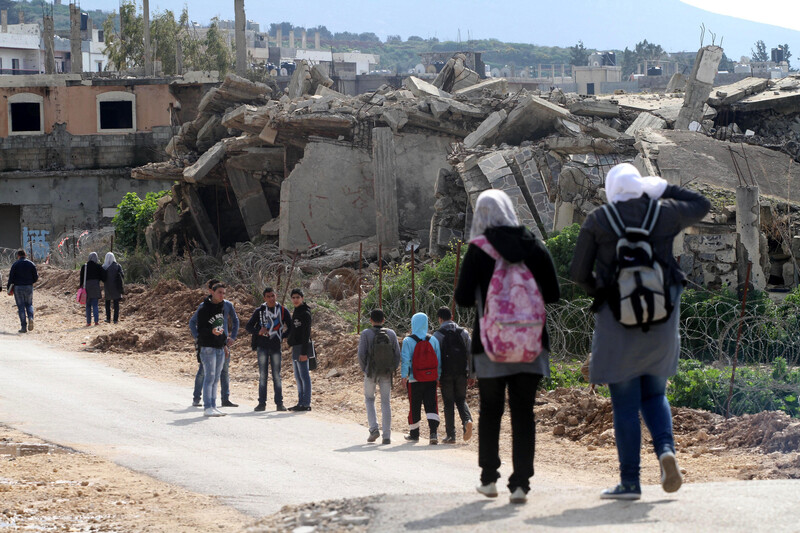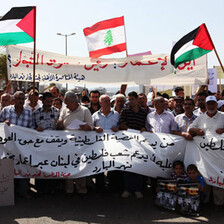The Electronic Intifada Beirut 18 June 2012

Nahr al-Bared camp remains in ruins after being leveled during the summer of 2007.
APA imagesWorking as a fixer in the summer of 2007, I spent most of my time shuttling between Beirut and northern Lebanon. I was fixing for many international news outlets covering the three-month-long war and severe violence in Nahr al-Bared Palestinian refugee camp near Tripoli. When I look back at that time now, it is a little like a slideshow in my head: images of the only prosperous camp in Lebanon, a city on its own by the sea, a hive of bustling activity.
Later the images shift: few buildings remain standing, many bombed flat to the ground, until finally I see the camp’s structures totally leveled, nothing left but rubble, empty of its estimated 40,000 inhabitants, besieged by army checkpoints and armored vehicles. By the end of the summer in 2007, more than 400 persons had died during the three month long bombardment of the camp by the Lebanese army. Since then the Lebanese army has surrounded the camp and maintained tight control over it, with Palestinians routinely subjected to military searches, an issue which has caused humiliation and anger among the refugees who live in the camp.
Teen killed at checkpoint
On the night of 15 June this year, the unarmed people of the camp were provoked to take to the streets by the killing of Ahmad Qassim, a 16-year-old Palestinian who lived in Nahr al-Bared, at a Lebanese army checkpoint in the camp.
The death of the young man has sparked outrage among the people of the camp. Many have left their homes to demand the end of the five-year-long siege and an end to the entry permit policy established by the army in 2007. People have been blocking the main roads in the camp and have started a sit-in protest demanding an immediate investigation of the killing.
Rabih Salah, an eyewitness to Qassim’s death, reported: “They stopped a young man on a motorbike, asked for his papers. Weirdly enough he gave it to them, and told them it was all legal [his papers]. On the spot a military officer shouted at him and told him to respect the officers when they talk to him, he seemed to have answered back; another soldier jumped over him and hit him with the bottom of his rifle.”
Qassim was standing next to the motorcyclist when he was shot.
Through a Skype live stream, youth from the camp spoke to The Electronic Intifada. Inspired by their Arab brethren revolting against injustice across the Arab world, the young Palestinian refugees have set up a media coordination center to cover their protest, which is taking place on the same spot where Qassim was shot, and to have their voices heard by the rest of the world.
“Speaking for ourselves”
Abu George, one of the hundreds amongst the masses who came out in the afternoon when the heat cooled down a bit, said, “This square where I’m standing now we just named Martyrs Square. It’s the spot exactly where the Lebanese army shot and killed Ahmad Qassim.
“The people are the ones who are deciding. These people in the streets you are looking at have demands; they won’t abandon their demands until they are all dealt with. It’s not the usual political factions, committees, or sheikhs who are speaking in our name. This time it’s us, the people, who are asking for our rights to be addressed, and representing ourselves. We don’t want anyone else to speak for us.”
Abu George expressed his bitterness at the Lebanese army. “For us Palestinians our only enemy is the Israeli occupation, not the Lebanese army but we have been getting subjugated by the Lebanese army for the last five years. We have humanitarian demands that need to be addressed. Our demands are only civilized, peaceful things to make our life easier and more livable in the Nahr al-Bared camp.”
Around Abu George other protestors chanted until one man took the microphone and addressed the gathered crowd.
“We don’t want to be led by anyone,” the man shouted. “If there is anyone here who wants to follow the politicians, then you are on your own. We are here speaking for ourselves; only us here are the ones to talk and be spoken to, us, the people.”
The crowd grew louder. “Military, come on, get out” and “Our blood, our souls, we sacrifice for you, martyr,” the protestors chanted in Arabic.
Again, the man with the microphone asked the protesters to pay attention:
“Listen to what I’m going to say: there are some people who are trying to hijack our protest and will tell you, ‘Let’s get out and march to Jerusalem.’ I want to remind you that we are here today because we have a specific cause and demands that we need to focus on until we get our rights. Don’t drift away from the reason we are here today: we want the end of the military siege.”
Protests to continue
Mamoun, a resident of Nahr al-Bared, and one of the organizers of the Skype livestream, described the vibrant protest.
“As you can see people are in the street making signs and writing their list of demands on a big banner.” Mamoun explained that another group of people are organizing for Qassim’s funeral. “The funeral tomorrow will not be the end of our protest. The people will continue protesting until our demands are achieved.”
Mamoun set out the people’s demands. “People are demanding the following: firstly, the end of the military rule in the camp. The people want an end of the military deployment among the residents of the camp. They want the system of permits, which they need to enter and exit, to end.
“Secondly, people insist on a full investigation and an explanation for the assassination of the martyr, which was followed by shooting at the civilians. Thirdly, people want the army to leave public spaces in the camp such as the graveyard, a football field, and a few residential buildings that are now occupied by the army.
“Fourthly, people want their freedom of speech, freedom for the media and news outlets to enter the camp [the army has banned or made it difficult for journalists to enter the camp since 2007]. In addition to all this, people are demanding guarantees that tomorrow they won’t be arrested by the army and investigated because of this peaceful protest.”
Through his Skype camera, Mamoun was able to show me the bullet holes on the balconies of residential apartments, remnants of the night Qassim was killed and other unarmed citizens were fired upon. To further demonstrate the peaceful nature of the protest the laptop was passed around. “Look, it’s all unarmed civilians, no one has a knife. “
Media bias
The Lebanese media have played down the protest and the aggression by the Lebanese army. Conflicting reports were published, some blaming the Palestinians openly, others refusing to hold the army accountable for their actions. The same kind of reporting was seen in 2007 when the Palestinians were blamed for the attacks against the army by Fatah al-Islam, a Salafist Islamist group which is not a Palestinian organization, but which had set up a presence in the camp.
This kind of biased reporting from the Lebanese media has not gone unnoticed by the residents of the camp, prompting one protestor to tell me: “I hope you will do honest reporting about us. I hope you won’t distort our message. Please don’t lie. See for yourself and let the world know we will be spending the night here; we will not leave the streets until we get all our rights. We want our dignity back; it’s not allowed to step on our pride and humiliate us anymore.”
At 6:30pm the grandfather of Ahmad Qassim, an elderly man wearing a white dishdasha (an ankle-length garment similar to a robe) took the stage and gave details about his grandson’s funeral.
“The funeral is tomorrow after the Aser [afternoon] prayers. It will start at the Badawi camp, then we will march towards Nahr al-Bared. I want to ask you all to honor the martyr by giving him a highly organized funeral and show the world that we are peaceful, civilized people. I want to ask you from this moment to start cleaning and preparing the streets for the many people who will join the funeral in solidarity with us. Let’s make the narrow streets of the camp fit for the march, thank you, brothers.”
Behind him Mamoun’s laptop showed thousands of people on Martyrs Square dancing and waving Palestinian flags.
Palestinians in the southern Lebanese camp of Ain al-Hilweh, another camp surrounded by barbed wire and the Lebanese army, took to the streets to protest in solidarity with Nahr al-Bared. The protest in Ain al-Hilweh camp started on the upper street and people marched towards the Lebanese army checkpoint chanting in Arabic, “Peaceful, peaceful” and “The leadership is shitty.” One resident was reported to have been killed during clashes with the army at Ain al-Hilweh today.
Few rights
The latest attack by the Lebanese army against unarmed Palestinian refugees is not new or the first of its kind. In 2007 three civilians were killed by military fire while protesting the war on the camp and demanding to return to their homes.
Palestinian refugees in Lebanon have few, or no, rights. They are completely disconnected from the Lebanese system and they are banned from practicing more than 70 professions. They live in camps with the highest poverty levels in the country.
Through their peaceful protest, the people of Nahr al-Bared have succeeded in lifting the siege for only one day, but a specter of uncertainty and insecurity still hovers over the camp. Solidarity and steadfastness are the only shields and weapons the people of the camp hold in their pursuit of a decent life.
This article has been amended since its original publication to clarify the circumstances of Ahmad Qassim’s death.
Moe Ali Nayel is a journalist and fixer based in Beirut.





